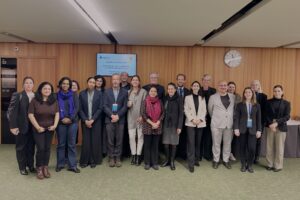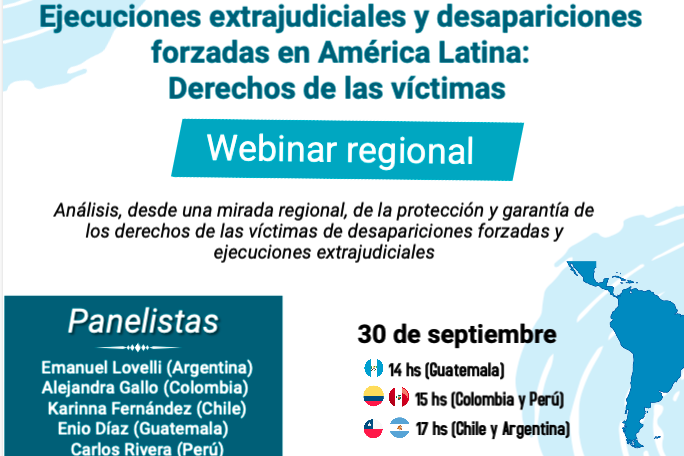
Sep 30, 2020 | Events, News
For decades, victims of enforced disappearances and extrajudicial killings in Latin America have been demanding justice, truth, and reparations. Despite these efforts, impunity remains rampant. In some cases, victims have been waiting for justice for over four decades.
As a part of its strategy to promote accountability for serious human rights violations around the world, the ICJ, together with partners, is implementing a regional project to address justice for extrajudicial killings and enforced disappearances in Colombia, Guatemala, and Peru, supported by the European Union.
One of the results of the project has been to support the production of three case dossiers by the ICJ’s local partners.
In Colombia, to illustrate one of the patterns of extrajudicial killings, the Asociación de Red Defensores y Defensoras de Derechos Humanos (dhColombia) produced a document concerning three cases of extrajudicial killings committed during 2006 and 2008.
The report Una práctica sistemática ejecuciones extrajudiciales en el eje cafetero (2006-2008) presents the challenges the victims and their lawyers have faced when seeking responsibility for those crimes.
In Peru, the Instituto de Defensa Legal (IDL) documented the enforced disappearances of university students and professors between 1989 to 1993, at the height of the internal conflict. In the report Los desaparecidos de la Universidad Nacional del Centro IDL describes the difficult legal path victims have faced in order to bring state agents suspected of committing crimes to justice.
In Guatemala, to highlight the manner in which enforced disappearances were committed against rural communities during the internal armed conflict, the Asociación de Familiares de Detenidos-Desaparecidos de Guatemala (Famdegua) wrote about the enforced disappearance of more than 500 people in the region of the Veparaces. In the report Las desapariciones forzadas en la región de las Verapaces the story of five cases is presented.
These three reports contribute towards understanding the prevalence of these violations in Latin America, and the available options to tackle impunity.
On 30 September 2020, the ICJ will host a regional webinar to discuss the protection and guarantee of the rights of victims of enforced disappearances and extrajudicial executions in Argentina, Colombia, Chile, Guatemala and Peru.
The webinar will be broadcast live on the ICJ’s Facebook page, at 14 hours (Guatemala time)/15 hours (Colombia and Peru time)/ 17 hours (Chile and Argentina time).
Contact
Kingsley Abbott, Coordinator of the Global Accountability Initiative, e: kingsley.abbott@icj.org
Carolina Villadiego Burbano, Legal and Policy Adviser, Latin America and Regional Coordinator of the Project, e: carolina.villadiego@icj.org
Rocío Quintero M, Legal Adviser, Latin America, e: rocio.quintero@icj.org
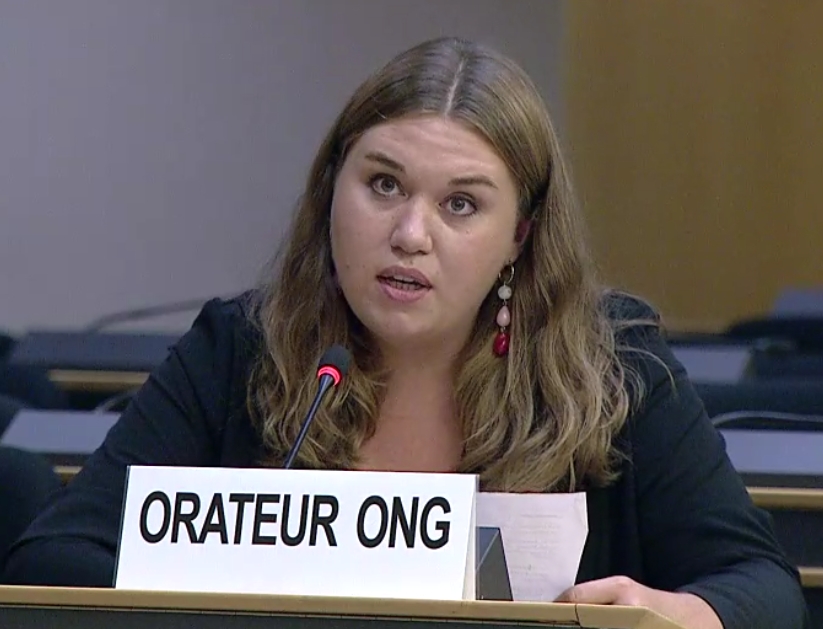
Sep 24, 2020 | Incidencia
La CIJ denunció hoy la continua impunidad en Venezuela, reforzada por la falta de independencia judicial, en el Consejo de Derechos Humanos de la ONU en Ginebra.
La declaración oral, emitida en un diálogo interactivo con la Misión Internacional para la Determinación de los Hechos establecida por el Consejo, decía lo siguiente:
Señora presidenta,
La Comisión Internacional de Juristas (CIJ) agradece el informe de la Misión y los esfuerzos que permitieron su elaboración y presentación teniendo en cuenta los retos derivados de la pandemia de la COVID-19.
La CIJ comparte las preocupaciones relativas a la falta de cooperación del gobierno con la Misión de Determinación de los Hechos. La CIJ recuerda que, conforme al derecho internacional, Venezuela tiene la obligación de asegurar la rendición de cuentas sobre las graves violaciones de derechos humanos que ocurren en el país.
La CIJ resalta que las violaciones documentadas en este informe se produjeron en medio de una ruptura gradual de las instituciones democráticas y del estado de derecho en Venezuela.
La CIJ ha documentado desde hace varios años la falta de independencia judicial y la ausencia de rendición de cuentas en el país por violaciones de derechos humanos, lo cual ha profundizado la impunidad.
La CIJ destaca la importante contribución de la Misión de Determinación de los Hechos a la rendición de cuentas por graves violaciones de derechos humanos en Venezuela, y urge al Consejo a extender y fortalecer el mandato de la Misión. La CIJ alienta a la Misión a examinar y ahondar con mayor detalle en las causas de las violaciones, los obstáculos de larga data que han impedido obtener rendición de cuentas en el nivel nacional, e incluir un análisis del rol y la responsabilidad de los individuos e instituciones del sistema de justicia por las violaciones y la impunidad.[1]
Finalmente, la CIJ invita a los expertos a ahondar en la recomendación realizada en el informe a los Estados respecto de “iniciar acciones legales contra los individuos responsables de las violaciones y los crímenes identificados”.
Gracias.
[1] Véase, CIJ, Practitioners Guide no. 13: Judicial Accountability, Disponible en: https://www.icj.org/icj-launches-new-practitioners-guide-on-judicial-accountability/
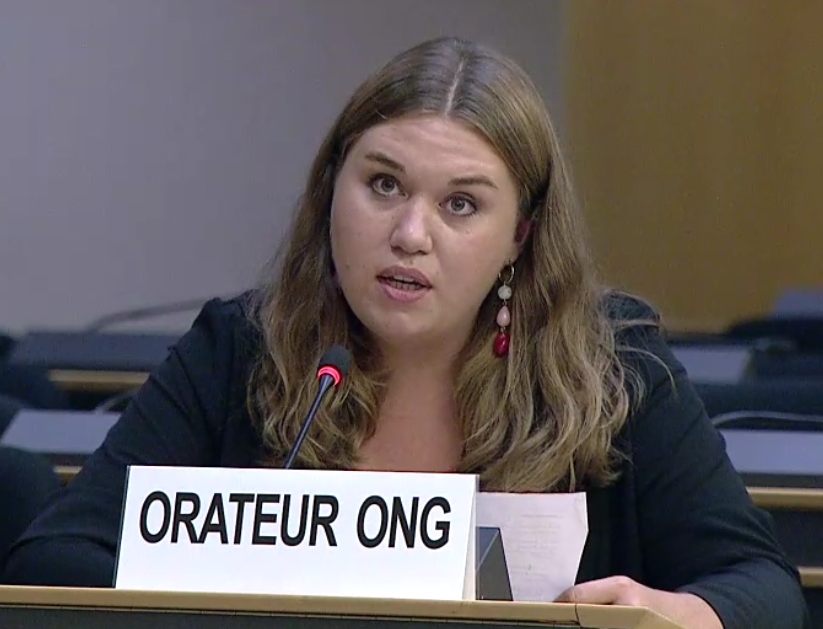
Sep 24, 2020 | Advocacy, Non-legal submissions
The ICJ today highlighted the continuing impunity in Venezuela, reinforced by lack of judicial independence, at the UN Human Rights Council in Geneva.
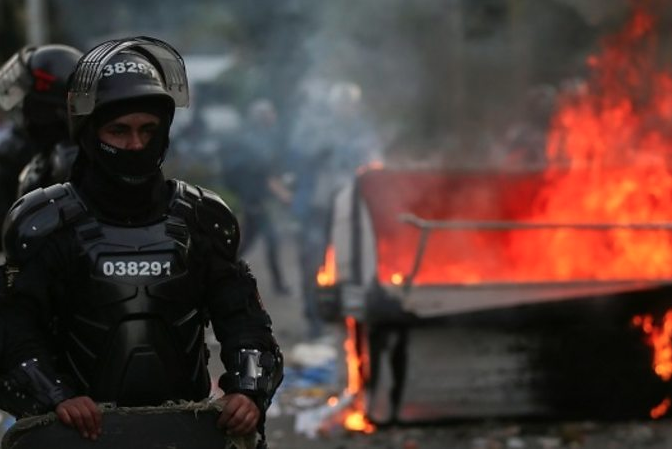
Sep 18, 2020 | Artículos, Noticias
Hoy, la CIJ realizó un llamado a las autoridades competentes para que se realicen investigaciones prontas, transparentes, rigorosas, imparciales y efectivas en los casos de posibles ejecuciones extrajudiciales y otras violaciones a los derechos humanos cometidas por la Policía colombiana durante las recientes protestas en la capital.
La CIJ enfatizó que cualquier persona responsable debe ser judicializada y llevada ante la justicia. Además, se debe garantizar el acceso a la justicia y a reparaciones a las víctimas.
Del 9 al 10 de septiembre de 2020, se llevaron acabo protestas masivas contra violaciones a los derechos humanos cometidas por la Policía. Las protestas tuvieron su origen en la muerte de Javier Ordóñez. Ordoñez falleció bajo custodia policial luego de haber sido sujeto a severos malos tratos, incluyendo múltiples descargas de electricidad con pistolas taser.
Durante las protestas, la Policía hizo un uso ilegítimo, innecesario y desproporcionado de la fuerza. Como resultado de las protestas, 13 personas fallecieron y más de 200 resultaron heridas.
Los hechos fueron condenados por la Comisión Interamericana de Derechos Humanos (CIDH), que señaló denuncias de detenciones ilegales y de malos tratos contra personas que fueron arrestadas. La Alta Comisionada de Naciones Unidas para los Derechos Humanos también expresó preocupación por las denuncias de uso excesivo de la fuerza durante las protestas.
Según testigos, la Policía abrió fuego contra personas que estaban protestando pacíficamente. Algunas de las personas asesinadas no hacían parte de las protestas y murieron al ser alcanzadas por balas perdidas. Algunos videos de la conducta policial durante las protestas han circulado en redes sociales.
En el mismo sentido, la alcaldesa mayor de Bogotá, Claudia López Hernández, afirmó que había entregado videos, con evidencia del abuso policial, a las autoridades competentes. López también compartió parte de estos videos en su cuenta de Twitter.
La CIJ recuerda que bajo los estándares del derecho internacional que regulan el uso de la fuerza por parte de oficiales encargados del mantenimiento del orden público, no debe hacerse uso de fuerza letal a menos que sea estrictamente necesario para proteger la vida.
La CIJ enfatiza la necesidad de que las investigaciones sean independientes, lo que requiere que los investigadores sean independientes de la policía. De igual forma, las investigaciones deben desarrollarse dentro de la jurisdicción ordinaria y no en la militar.
La CIJ también expresa su preocupación por las amenazas recibidas por defensores de derechos humanos que estaban monitoreando el desarrollo de las protestas.
Antecedentes
Las protestas tuvieron su origen en la muerte de Javier Ordóñez, quien murió en un Comando de Acción Inmediata (CAI), en la madrugada del 9 de septiembre de 2020.
Un video muestra que antes de ser trasladado al CAI, policías dispararon pistolas taser contra Ordóñez a pesar que este ya se encontraba en el suelo inmovilizado y no representaba ninguna amenaza contra la vida o seguridad de los policías.
Los resultados iniciales de las investigaciones, incluyendo el reporte de la autopsia, indican que Ordóñez recibió golpes en la cabeza, el cuello, los hombres y el pecho al interior del CAI.
El 11 de septiembre de 2020, la Policía Nacional y el Ministro de Defensa ofrecieron disculpas por cualquier violación que hubieran podido cometer los uniformados. No obstante, no hubo reconocimiento de ninguna violación en particular. Posteriormente, el 16 de septiembre, el Ministro de Defensa reconoció que Javier Ordóñez había sido asesinado por la Policía.
Aunque el Ministro dijo que la policía respetaba las protestas pacíficas, afirmó que “lo ocurrido el 9 y 10 de septiembre fue un ataque masivo y sistemático en contra de la infraestructura policial y de los agentes de Policía”.
Adicionalmente, el 13 de septiembre, la Alcaldía mayor de Bogotá llevó a cabo una jornada de perdón y reconciliación. En la jornada participaron algunas de las víctimas, que exigieron justicia.
El 17 de septiembre de 2020, la Fiscalía General de la Nación solicitó orden de captura contra dos policías involucrados en la muerte de Ordoñez, la cual fue concedida por un juez. Los dos policías ya fueron capturados.
De conformidad con las obligaciones internacionales de Colombia consagradas en el Pacto Internacional de Derechos Civiles y Políticos, las investigaciones siempre deben ser independientes, imparciales, prontas, rigurosas, efectivas, creíbles y transparentes.
Los Principios Básicos sobre el Empleo de la Fuerza y de Armas de Fuego por los Funcionarios Encargados de Hacer Cumplir la Ley establecen que el uso de la fuerza deber ser excepcional, necesario y proporcional. Además, determinan que la fuerza letal solo puede usarse para proteger la vida.
Recientemente, Colombia ha sufrido de un aumento significativo en las violaciones y abusos a los derechos humanos, incluidas las muertes ilícitas. Por ejemplo, desde la firma del Acuerdo de Paz, en noviembre de 2016, han aumentado los asesinatos, amenazas de muertes y hostigamientos contra los defensores de derechos humanos.
A diciembre de 2019, la Misión de Verificación en Colombia de las Naciones Unidas verificó el asesinato de 303 defensores/as de derechos humanos y líderes sociales desde la firma del Acuerdo. Durante 2020, la Oficina de la Alta Comisionada para los Derechos Humanos en Colombia ha documentado 47 asesinatos y se encuentra verificando otros 44 casos potenciales.
Contactos:
Carolina Villadiego, Asesora Legal, América Latina. Email: carolina.villadiego(a)icj.org
Rocío Quintero M, Asesora Legal, América Latina. Email: rocio.quintero(a)icj.org
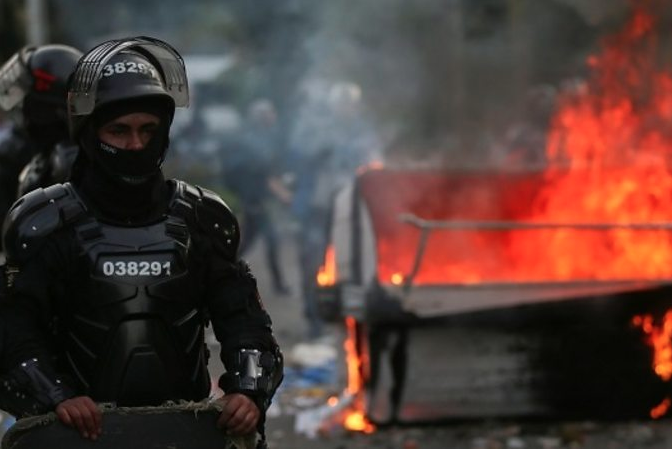
Sep 18, 2020 | News
Today, the ICJ called upon the responsible authorities to ensure that prompt, transparent, thorough, impartial and effective investigations are carried out of allegations of extrajudicial killings and other serious human rights violations by the Colombian police during recent street protests.
The ICJ stressed that any official responsible should be prosecuted and brought to justice and victims of any violations be provided an effective remedy and reparation.
From 9 September to 10 September 2020, mass protests against serious human rights violations by Colombian police took place in Bogota, following the death of Javier Ordóñez. Ordoñez died in police custody after he had been subjected to severe ill-treatment, including by prolonged taser shock.
The protests were met with acts of unlawful, unnecessary and disproportionate use of force by police. The protests left 13 people dead, and more than 200 injured.
The incidents have been condemned by the Inter-American Commission on Human Rights (IACHR), which pointed to allegations of unlawful detention and ill-treatment of persons arrested following the demonstrations. The UN High Commissioner for Human Rights has also expressed concern at the allegations the use of excessive force during the protests.
According to witness accounts, police opened fire against people who were protesting peacefully. Some of the victims killed were said to be people who had not taken part in the protests and died due to stray bullets. Some videos of police conduct have been circulated on social media.
Similarly, Bogota Mayor, Claudia López Hernández, has affirmed that she had handed over videos of police shooting indiscriminately against people during the protests to the Office of the Attorney General and other authorities. In addition, she shared part of the videos on her Twitter account.
The ICJ recalls that under international standards governing the use of force by law enforcement officials, lethal force may never be used unless strictly necessary to protect life.
The ICJ stresses that investigations must be impartial and the need for investigators to be independent of the police. Equally important, the investigations must take place within the civilian rather than the military justice system.
The ICJ is also concerned at the threats received by human rights lawyers who have been working working to document possible human rights violations during the protests.
Background
The protests were triggered by the death of Javier Ordoñez, who died at a police facility (Comando de Acción Inmediata, CAI), on the early morning of 9 September.
A video shows that before being transferred to the facility, Ordoñez was repeatedly shocked by policemen with a stun gun while on the ground and did not represent any threat to life or safety the police or other persons. Initial results of the investigation, including the autopsy report, indicate that Ordoñez was hit in the head, neck, shoulders, and chest inside the police facility.
On 11 September 2020, the Police and the Ministry of Defence offered an “apology” for any violation of the law that may have been committed by the police, without acknowledging any specific wrongdoing.
Subsequently, on 16 September, the Minister of Defence recognized that Javier Ordóñez was murdered by the police. Although he stated that the Police respect peaceful protests, he also said the protests of September 9 and 10 were a massive and systematic attack against the police.
Along the same lines, on 13 September 2020, the office of the Mayor of Bogotá held a ceremony of “forgiveness and reconciliation”. The ceremony had the participation of some of the victims, who demanded justice.
On 17 September 2020, the Office of the Attorney General filed arrest warrants against two policemen involved in the murder of Ordóñez. The warrants have been granted by a judge. Both policemen had been arrested.
In accordance with Colombia’s obligations under the International Covenant on Civil and Political Rights, investigations “must always be independent, impartial, prompt, thorough, effective, credible and transparent”.
The UN Basic Principles on the Use of Force and Firearms by Law Enforcement Officials require that any the use of force is exceptional, necessary, and proportional and that lethal force may only be used when strictly necessary to protect life.
Colombia has been recently facing a significant increase in serious human right violations and abuses, including unlawful killings. For example, since the Peace Agreement was signed in November 2016, there has been an upward trend in the killings, death threats, and harassments against human rights defenders.
As of December 2019, the UN Verification Mission in Colombia verified 303 killings of human rights defenders and social leaders since the signature of the Peace Agreement. So far, during 2020, the Office of the United Nations High Commissioner for Human Rights in Colombia has documented 47 killings of human rights defenders and is reviewing other potential 44 cases.
Contact:
Carolina Villadiego, Legal and Policy Adviser, Latin America. Email: carolina.villadiego(a)icj.org
Rocío Quintero M, Legal Adviser, Latin America. Email: rocio.quintero(a)icj.org






